英语人教版八年级下册标题设计
- 格式:doc
- 大小:54.00 KB
- 文档页数:16

教学设计Unit 5 What were you doing when the rainstorm came? Section A Period2 3a reading一、关于课程标准的研究本课为八年级下册人教版新目标Unit 5 Section A 3a Reading的阅读课。
是关于过去进行时的的教学。
在整个初中教学过程中,过去进行时是很重要的组成部分。
同时本课话题为灾难性自然天气给人们带来了烦恼,同时由于互相帮助也拉近了邻里关系和人们内心的距离。
对学生进行了很好的情感态度价值观的教育。
学生可以想到其他的拉近人们心灵的时间和话题进行探讨和写作。
二、教材资源分析本课内容选自人民教育出版社出版的新课标英语八年级下册Unit5 What were you doing when the rainstorm came?第二课时Section A Period 2阅读课。
这套教材在培养学生的英语语言能力的同时,以素质教育为核心,以提高学生的听说读写全面素质为根本目的,开发学生的潜力,培养他们的创新运用精神。
本课的主题是对难忘的事件的表述,暴风雨的灾难是大事件,其他大事件同样令人难忘,可以展开讨论,这类讨论的开放度很大,对于学生驾驭语言的水平也高,教师可提供一些语言帮助。
三、学生分析大部分学生对大事件例如暴风雨时自己在干什么并不陌生,他们基本在以前的学习生活和阅读中已接触过一些词汇。
但对于来自村镇的部分孩子来说,尽管之前学过,但由于没有家庭阅读氛围环境,以及个别地方小学对英语科目的不重视,这导致学生对已学知识的淡忘。
因此学生两级分化比较严重。
这需要提前了解学生的来源小学英语教学情况和家庭学习氛围。
同时可以通过问卷调查的方式去了解学生的天气情况单词和句式的掌握等。
学习大事件时人们在干嘛,可以用简笔画的形式导入呈现,这个年龄段得孩子还是热爱绘画的方式去学习的,这一点可以很好的去发挥简笔画的作用。
从而调动学生学习英语的积极性。

(完整word版)新版人教版八年级英语下册全册教案(word版可编辑修改) 编辑整理:尊敬的读者朋友们:这里是精品文档编辑中心,本文档内容是由我和我的同事精心编辑整理后发布的,发布之前我们对文中内容进行仔细校对,但是难免会有疏漏的地方,但是任然希望((完整word版)新版人教版八年级英语下册全册教案(word版可编辑修改))的内容能够给您的工作和学习带来便利。
同时也真诚的希望收到您的建议和反馈,这将是我们进步的源泉,前进的动力。
本文可编辑可修改,如果觉得对您有帮助请收藏以便随时查阅,最后祝您生活愉快业绩进步,以下为(完整word版)新版人教版八年级英语下册全册教案(word版可编辑修改)的全部内容。
新版人教版八年级英语下册全册教案Unit 1 What's the matter?教学目标:1语言目标:描述健康问题的词汇,及如何根据别人的健康问题提建议。
2 技能目标:能听懂谈论健康问题的对话材料;能根据别人的健康问题提建议;能写出重点单词和重点句型,并能描述怎样对待健康问题。
3 情感目标:通过开展扮演病人等活动,培养学生关心他人身体健康的品质.通过本课的阅读,培养学生处理紧急事件的基本能力,树立紧急事件时互相帮助的精神。
教学重点:短语:have a stomachache,have a cold,lie down,take one’s temperature,go to a doctor, get off,to one’s surprise, agree to do sth。
, get into trouble,fall down, be used to, run out (of), cut off , get out of, be in control of ,keep on (doing sth.), give up句子: 1 What’s the matter?I have a stomachache. You shouldn’t eat so much next time.2 What’s the matter with Ben?He hurt himself。
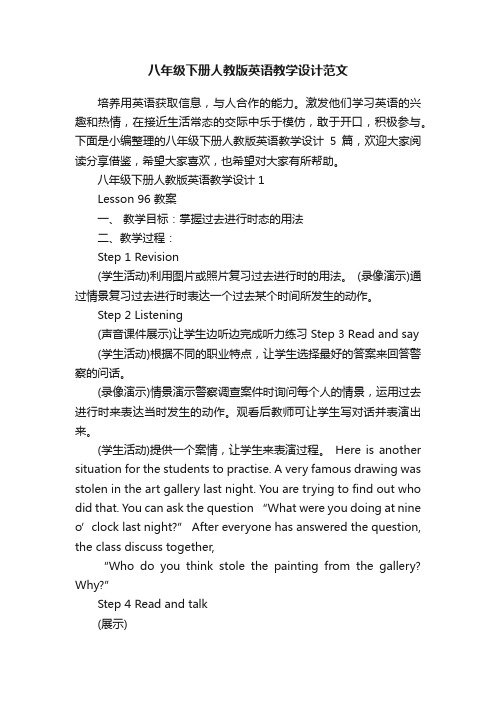
八年级下册人教版英语教学设计范文培养用英语获取信息,与人合作的能力。
激发他们学习英语的兴趣和热情,在接近生活常态的交际中乐于模仿,敢于开口,积极参与。
下面是小编整理的八年级下册人教版英语教学设计5篇,欢迎大家阅读分享借鉴,希望大家喜欢,也希望对大家有所帮助。
八年级下册人教版英语教学设计1Lesson 96 教案一、教学目标:掌握过去进行时态的用法二、教学过程:Step 1 Revision(学生活动)利用图片或照片复习过去进行时的用法。
(录像演示)通过情景复习过去进行时表达一个过去某个时间所发生的动作。
Step 2 Listening(声音课件展示)让学生边听边完成听力练习 Step 3 Read and say (学生活动)根据不同的职业特点,让学生选择最好的答案来回答警察的问话。
(录像演示)情景演示警察调查案件时询问每个人的情景,运用过去进行时来表达当时发生的动作。
观看后教师可让学生写对话并表演出来。
(学生活动)提供一个案情,让学生来表演过程。
Here is another situation for the students to practise. A very famous drawing was stolen in the art gallery last night. You are trying to find out who did that. You can ask the question “What were you doing at nine o’clock last night?” After everyo ne has answered the question, the class discuss together,“Who do you think stole the painting from the gallery? Why?”Step 4 Read and talk(展示)Read the table about what David was doing at different times yesterday, then ask and answer in pairs.(录像演示)情景演示询问过去某个时间点正在进行的动作,看后让学生进行模仿练习。
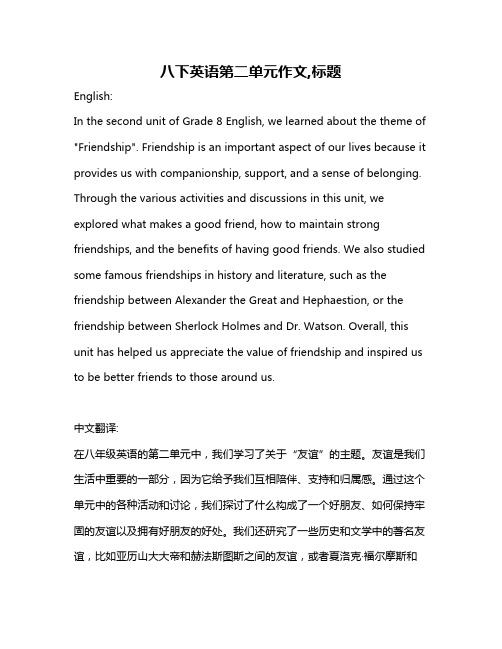
八下英语第二单元作文,标题English:In the second unit of Grade 8 English, we learned about the theme of "Friendship". Friendship is an important aspect of our lives because it provides us with companionship, support, and a sense of belonging. Through the various activities and discussions in this unit, we explored what makes a good friend, how to maintain strong friendships, and the benefits of having good friends. We also studied some famous friendships in history and literature, such as the friendship between Alexander the Great and Hephaestion, or the friendship between Sherlock Holmes and Dr. Watson. Overall, this unit has helped us appreciate the value of friendship and inspired us to be better friends to those around us.中文翻译:在八年级英语的第二单元中,我们学习了关于“友谊”的主题。
友谊是我们生活中重要的一部分,因为它给予我们互相陪伴、支持和归属感。
通过这个单元中的各种活动和讨论,我们探讨了什么构成了一个好朋友、如何保持牢固的友谊以及拥有好朋友的好处。
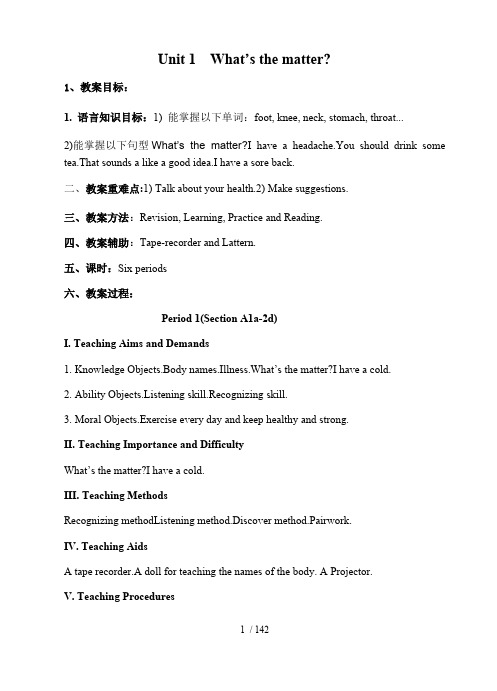
Unit 1 What’s the matter?1、教案目标:1. 语言知识目标:1) 能掌握以下单词:foot, knee, neck, stomach, throat...2)能掌握以下句型What’s the matter?I have a headache.You should drink some tea.That sounds a like a good idea.I have a sore back.二、教案重难点:1) Talk about your health.2) Make suggestions.三、教案方法:Revision, Learning, Practice and Reading.四、教案辅助:Tape-recorder and Lattern.五、课时:Six periods六、教案过程:Period 1(Section A1a-2d)I. Teaching Aims and Demands1. Knowledge Objects.Body names.Illness.What’s the matter?I have a cold.2. Ability Objects.Listening skill.Recognizing skill.3. Moral Objects.Exercise every day and keep healthy and strong.II. Teaching Importance and DifficultyWhat’s the matter?I have a cold.III. Teaching MethodsRecognizing methodListening method.Discover method.Pairwork.IV. Teaching AidsA tape recorder.A doll for teaching the names of the body. A Projector.V. Teaching ProceduresLead-in Name the parts of the body by pictures.Step 1Read a chant about the body.Step 2Enjoy a song.Step 3Play a game. Say and draw the part of body.Step 4Activity 1a.Let Ss to look at the picture and write the correct letter [a-m] for each part of the body.Step 5Judge their problems based on every picture.Step 6Activity 1b.Listen and look at the picture. Then number the names [1-5].Step 7Act it out with their partner.Step 8Listen again and complete the table.Step 9Activity 1c. Pair works.Make conversations according to pictures.Step 10Think how to give advice if somebody is ill and give examples by using pictures.Step 11Activity 2a.Let Ss to listen and number the pictures [1-5] in the order they hear them.Step 12Activity 2b.Listen again and match the problems with the advice.Step 13Activity 2c.Make conversations using the information in 2a and 2b.Step 14Activity 2d.Role-play the conversation.Step 15Language points: explain the key words and phrases in section A-1.Homework:Teaching thought:Period 2(Section A 3a-3c)I. Teaching Aims and Demands1. Knowledge Objects New words.Some advice.Grammar Focus.2. Ability ObjectsListening skill.Reading skill.Writing municative competence.3. Moral Object To be a doctor and serve the people heart and soul.II. Teaching Importance and DifficultyWhat’s the matter?I have a toothache.Maybe you should see a dentist.That’s a good idea.III. Teaching Methods Listening method.Reading and writing methods.Pair-work.IV. Teaching Aids A tape recorderA projector.V. Teaching ProceduresLead-in Review some usual disease by pictures.Step 1Talk about advice about health.Step 2Learn some new words.Step 3Discussion.Look at the title and the picture. Work in pairs and discuss some questions.Step 4Activity 3a.Read the passage. Discuss where it comes from.Step 5Give some reading strategies simply.Step 6Read the passage and do true or false.Step 7Activity 3b.Ask Ss to read the passage again and check (√) the things that happened in the story.Step 8Free talk.If you see someone lying on the street, what should you do?.Step 9Respect the aged and care for the young. It is a fine tradition of the Chinese nation. Teach the spirit to Ss.Step 10Activity 3c.Discuss the questions with a partner.Step 11Language points: explain the key words and phrases in section A-2.Step 12More exercises about the language points.Homework:Teaching thought:Period 3(Grammar Focus-4c)I. Teaching Aims and Demands1. Knowledge Objects Reading and writing materials.Oral Practice.2. Ability Objects Reading skill.Writhing municative competence.3. Moral Object Give good advice when someone needs your help.II. Teaching Importance and Difficulty Reading practice.Oral practice.III. Teaching Methods Reading and writing methods.Pair-work.Group-work.IV. Teaching Aids Workbook exercises.V. Teaching ProcedureLead-in Role - play a conversation between a patient and a doctor.Step 1List some health problems and give some advice.Step 2Explanation about the use of modal verb should.Step 3Do some basic exercise.Step 4Compare some other modal verbs.Step 5Do more exercise.Step 6Complete activity 4a and 4b.Step 7Work in groups. Discuss how to keep ourselves healthy.Step 8Complete activity 4c.Step 9Do exercise to review the structures of this unit.Homework Finish off the exercises of workbook.Teaching thought:Period 4(Section B 1a-1d)I. Teaching Aims and Demands1. Knowledge Objects Key vocabulary.Reading practice.Oral practice.2. Ability ObjectsListening skill.Reading skill.Writhing skill.Practice municative competence.3. Moral Object Ask for help when you have problem.II. Teaching Importance and DifficultyKey vocabulary.Reading practice.Oral practice.III. Teaching MethodsReading and writing methods.Understanding method.Pair-work.Listening method.IV. Teaching Aids A tape recorder.V. Teaching ProceduresLead-in Free talk:When these accidents happen, what should you do?Step 1Activity 1a.Put the actions in order.Step 2Activity 1b.Listen to the school nurse. Check (√) the problems you hear.Step 3Activity 1c.Listen again. Write the letter of each treatment next to the problemsyou checked in thechart above.Step 4Free talk:1. What would you do in these situations?2. What could we do to prevent these accidents?Step 5Give advice when accidents happen.Step 6Pair works.Let Ss make conversations.E.g.:A:Who came to your office today?B: First, a boy came in. He hurt himself in P.E. class.A: What happened?B: …Homework After class you can talk to an expert about a particular problem.For exaple, what should I do when I have problems with my little brother?Teaching thought:Period 5(Section B 2a-2e)I. Teaching Aims and Demands1. Knowledge Objects Key vocabulary.Reading material.Group work.2. Ability Objects Reading skill.Writhing municative competence.3. Moral Object Great Chinese culture.II. Teaching Importance and DifficultyKey vocabulary.Reading practice.Writing exercise.Group-work.III. Teaching Methods Reading and writing municative approach.IV. Teaching Aids A projector.V. Teaching ProceduresLead-in Learn some new words.Step 1Free talk:What is the most important in our life?Step 2Think about the question by giving pictures:What kind of accident or problem can happen when you …?Step 3Think about some accidents and talk about some advice to protect them.Step 4Activity 2a.Write the letter of each sport next to each accident or problem that can happen.Step 5Discuss these questions in groups.Step 6Activity 2b.Read the passage and underline the words you don’t know.Step 7Activity 2c.Read the statements and circle True, False or Don’t know.Step 8Activity 2d.Read the passage again and answer the questions.Step 9Activity 2e.Put the sentences in the correct order.Step 10Introduce the story of 127 Hours.Homework Write down the sentences about when you’re tired in your exercise book.Teaching thought:Period 6(Section B 3a-Self Check)I. Teaching Aims and Demands1. Knowledge Objects Vocabulary in this unit.Writing practice.Just for Fun.2. Ability Objects Reading skill.Writhing municative competence.3. Moral Object Give your help to who needs one.II. Teaching Importance and Difficulty Vocabulary in this unit.Writing practice.III. Teaching Methods Reading and writing methods.Self check method.IV. Teaching Aids A projector.V. Teaching ProceduresStep 1Enjoy a video: Between a Rock and a Hard Place.Step 2Talk about a story about a person who once were “between a rock and a hard place”.Step 3Activity 3a:Imagine you are the school nurse and a student just had an accident or a health problem. Make notes about what he/she should and shouldn’t do.Step 4Activity 3b:Write a conversation between the nurse and the student using the notes in 3a.Step 5Do self – check.Step 6Language points: explain the key words and phrases in section B-2.Step 7More exercisers about the language points.Homework Finish off the workbook exercises.Teaching thought:Unit 2 I’ll help to clean up the city park.一、教案目标:1. 语言知识目标:1) 能掌握以下单词:clean up, city, cheer, cheer up, give out, volunteer, notice,...2)能掌握以下句型:① You could help to clean up the city parks. ....3) 能了解以下语法:情态动词could, should的用法;用should或could提出建议并对别人的建议作出评价。
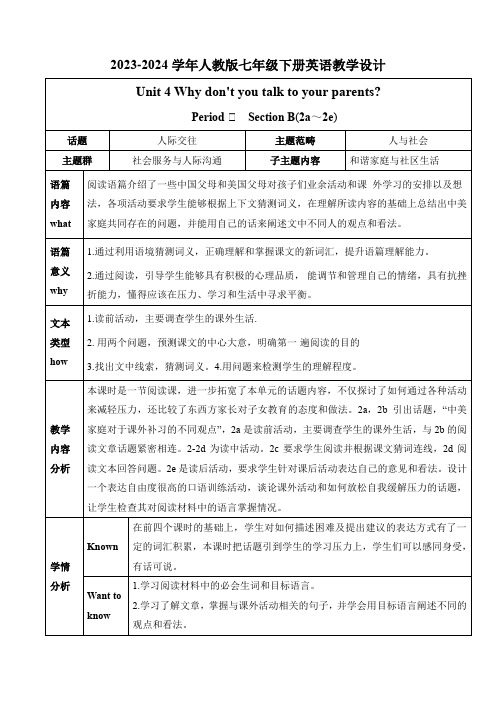
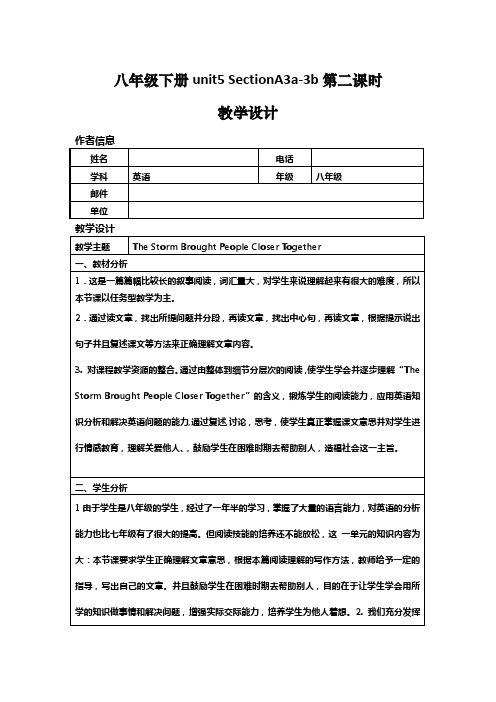
八年级下册unit5 SectionA3a-3b第二课时教学设计新目标六三制初中英语八年级下册Unit5sectionA3a-3b第二课时学情分析本学期我担任八年级英语教学工作,就近段时间对学生的了解来看,学生的总体水平不低,但也从教学中发现了不少问题。
现将学生的英语学习情况分析如下:八年级的学生性格特点是活泼好动,参与活动的热情会较高。
面对可塑性很强的学生,作为英语教师,我们一定要保护他们对英语学习的热情。
认知特点分析:学生已经学过过去进行时,本单元第一课时的学习也帮助学生对过去进行时有了初步的感知,学生理解上相对容易。
根据学生的心理特点我们一改以往教学生时的教学模式,课上多以表扬为主,注重对学生英语学习兴趣的培养,鼓励他们大胆说、积极做、努力尝试!让学生们在玩玩、做做、说说、谈谈中学习英语。
但这个年级的学生在学习方法和学习策略上还有待提高,尤其在答题技巧和技能方面还缺少锻炼。
因此本学期在实施英语教学的过程中,我和上学期一样在教授学生新知的同时更重视对学生学习方法和答题技巧的培养。
我一心争取在本学期让学生的学习能力和应试能力在原有的基础上能大幅度提高。
除以上所说的几种情况之外,八年级个别学生还存在顽劣和懒惰倾向,上课爱搞小动作、课下作业完成不及时的坏毛病,学习效率也较差。
针对这种情况我采取趣味教学的模式课上多为学生创设习得语言的环境,尽最大努力吸引学生的注意力以便更有交地激发他们的学习兴趣,而且课后老师经常找机会和他们聊天、交朋友,帮助他们转变厌学思想。
老师针对学生现状,在课堂上尽量以鼓励表扬为主,注重培养学习英语的兴趣,营造英语氛围,鼓励学生开口说英语、特别是给差生创造机会,让他们尝试成功的喜悦。
新目标六三制初中英语八年级下册Unit5 sectionA3a-3c第二课时效果分析通过free talking直接导入本节内容,直奔导入新课,简洁明了。
一.学生当堂对课文进行了多次阅读,并让学生仔细品读文章每一段落,总结概括大意并完成句子,锻炼学生的阅读能力,应用英语知识分析和解决英语问题的能力。
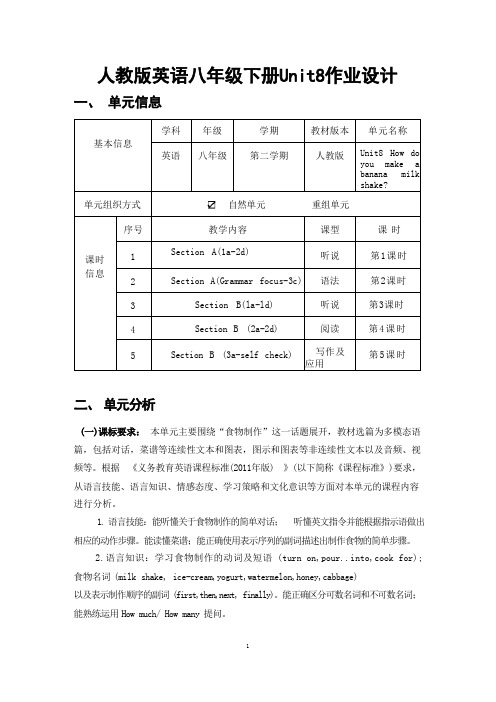
人教版英语八年级下册Unit8作业设计一、单元信息二、单元分析(一)课标要求:本单元主要围绕“食物制作”这一话题展开,教材选篇为多模态语篇,包括对话,菜谱等连续性文本和图表,图示和图表等非连续性文本以及音频、视频等。
根据《义务教育英语课程标准(2011年版) 》(以下简称《课程标准》)要求,从语言技能、语言知识、情感态度、学习策略和文化意识等方面对本单元的课程内容进行分析。
1. 语言技能:能听懂关于食物制作的简单对话;听懂英文指令并能根据指示语做出相应的动作步骤。
能读懂菜谱;能正确使用表示序列的副词描述出制作食物的简单步骤。
2.语言知识:学习食物制作的动词及短语 (turn on,pour..into,cook for);食物名词(milk shake, ice-cream,yogurt,watermelon,honey,cabbage)以及表示制作顺序的副词(first,then,next, finally)。
能正确区分可数名词和不可数名词;能熟练运用How much/ How many 提问。
情感态度:积极参加综合运用英语的实践活动,在家能积极主动承担家务。
乐于了解他国文化,对家乡产生热爱之情。
学习策略:将语言学习与实践运用结合起来,学会认识菜谱并根据菜谱指示正确做出食物。
5. 文化意识:通过了解美国感恩节的习俗和美食加深对文化异同的理解,建构多元文化视角,培养社会责任感。
(二)教材分析:本教材版本为人民教育出版社2013年6月第一版新目标(Gofor it) 八年级上册英语。
本册书共包含10单元,每一单元都包含特定的话题,功能,结构,目标语言和相应词汇。
本单元是人教版新目标八年级上册第八单元 Unit8 How do you make a banana milk shake? 本单元的主题是如何制作食物。
通过学会正确使用单词及短语,再学会用序列词描述做一件事情的步骤。
使学生积极参与合作,从而培养学生的综合语言运用能力,教材在本单元的开篇设计的活动是制作香蕉奶昔。

最新版(2013版)7-9年级各个单元标题七年级上册各单元标题预备篇Starter Unit 1 Good morning!Starter Unit 2 What’s this in English?Starter Unit 3 What color is it?Unit1My name’s Gina.Unit2 This is my sister.Unit3 Is this your pencil?Unit4 Where’s my schoolbag?Unit5 Do you have a soccer ball?Unit6 Do you like bananas?Unit7 How much are these socks?Unit8 When is your birthday?Unit9 My favorite subject is science.七年级下册各单元标题:Unit 1 Can you play the guitar?Unit 2 What time do you go to school?Unit 3 How do you go to school?Unit 4 Don't eat in class.Unit 5 Why do you like pandas?Unit 6 I’m watching TVUnit7 It’s raining!Unit 8 Is there a post office near here?Unit 9 What does he look like?Unit 10 I'd like some noodlesUnit 11 How was your school trip?Unit 12 What did you do last weekend?八年级上册各单元标题:Unit 1 Where did you go on vacation?Unit 2 How often do you exercise?Unit 3 I'm more outgoing than my sister.Unit 4 What's the best movie theater?Unit 5 Do you want to watch a game show?Unit 6 I'm going to study computer science.Unit 7 Will people have robots?Unit 8 How do you make a banana milk shake?Unit 9 Can you come to my party?Unit 10 If you go to the party, you'll have a great time!八年级下册各单元标题Unit 1 What's the matter?Unit 2 I’ll help clean up the city parksUnit 3 Could you please clean your room?Unit 4 Why don't you talk to your parents?Unit 5 What were you doing when the rainstorm came?Unit 6 An old man tried to move the mountains.Unit 7 What’s the highest mountain in the world?Unit 8 Have you read Treasure Island yet?Unit 9 Have you ever been to a museum?Unit 10 I've had this bike for three years.九年级全册个单元标题Unit1 How can we become good learners ?Unit 2 I think that mooncakes are delicious.Unit 3 Could you please tell me where the restrooms are ? Unit 4 I used to be afraid of the darkUnit 5 What are the shirts made of ?Unit 6 When was it invented ?Unit7 Teenagers should be allowed to choose their own clothes Unit 8 It must belong to CarlaUnit 9 I like music that I can dance toUnit 10 You are supposed to shake handsUnit11 Sad moives make me cry.Unit 12 Life is full of the expected.Unit 13 We’re trying to save the earth.Unit14 I remember meeting all of you in Grade 7.。
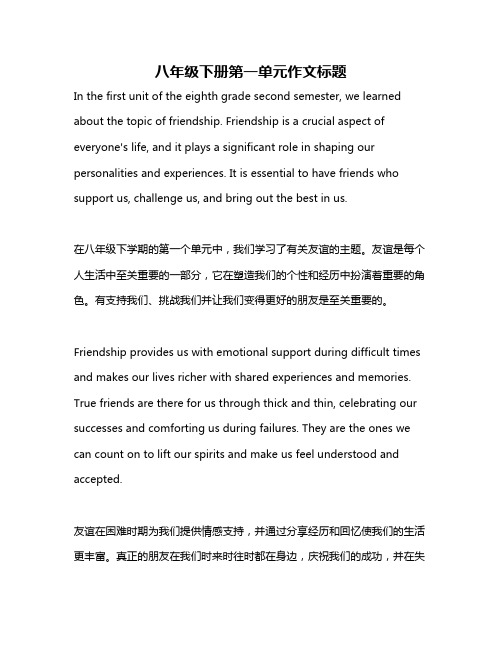
八年级下册第一单元作文标题In the first unit of the eighth grade second semester, we learned about the topic of friendship. Friendship is a crucial aspect of everyone's life, and it plays a significant role in shaping our personalities and experiences. It is essential to have friends who support us, challenge us, and bring out the best in us.在八年级下学期的第一个单元中,我们学习了有关友谊的主题。
友谊是每个人生活中至关重要的一部分,它在塑造我们的个性和经历中扮演着重要的角色。
有支持我们、挑战我们并让我们变得更好的朋友是至关重要的。
Friendship provides us with emotional support during difficult times and makes our lives richer with shared experiences and memories. True friends are there for us through thick and thin, celebrating our successes and comforting us during failures. They are the ones we can count on to lift our spirits and make us feel understood and accepted.友谊在困难时期为我们提供情感支持,并通过分享经历和回忆使我们的生活更丰富。
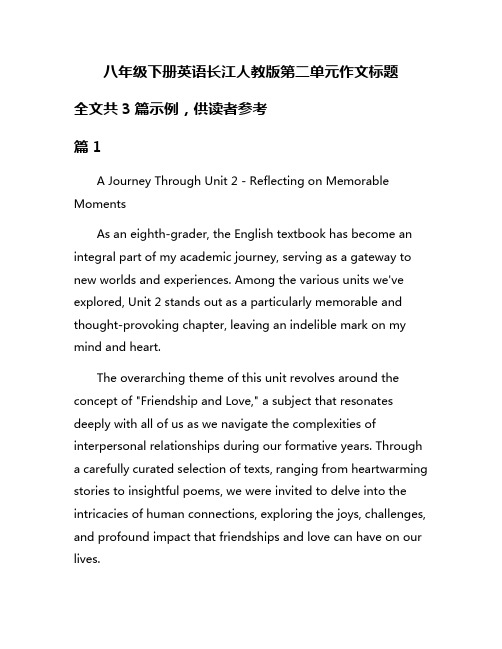
八年级下册英语长江人教版第二单元作文标题全文共3篇示例,供读者参考篇1A Journey Through Unit 2 - Reflecting on Memorable MomentsAs an eighth-grader, the English textbook has become an integral part of my academic journey, serving as a gateway to new worlds and experiences. Among the various units we've explored, Unit 2 stands out as a particularly memorable and thought-provoking chapter, leaving an indelible mark on my mind and heart.The overarching theme of this unit revolves around the concept of "Friendship and Love," a subject that resonates deeply with all of us as we navigate the complexities of interpersonal relationships during our formative years. Through a carefully curated selection of texts, ranging from heartwarming stories to insightful poems, we were invited to delve into the intricacies of human connections, exploring the joys, challenges, and profound impact that friendships and love can have on our lives.One of the texts that particularly captivated me was the story "The Gift of the Magi," a timeless tale that beautifully illustrates the selfless nature of true love. The protagonists, Della and Jim, were willing to sacrifice their most prized possessions to bring happiness to one another, exemplifying the profound depths of their affection. This poignant narrative not only tugged at my heartstrings but also prompted me to reflect on the significance of cherishing and appreciating the loved ones in my life.Another highlight of this unit was the poem "My Friend John," which painted a vivid portrait of an enduring friendship that withstood the test of time and distance. The poet's ability to capture the essence of a lifelong bond, even when separated by vast geographical distances, resonated deeply with me. It served as a powerful reminder that true friendships transcend physical boundaries and can provide solace and support even in the most trying of circumstances.Beyond the literary works themselves, the unit also incorporated engaging activities and exercises that encouraged us to apply the concepts we learned in practical and meaningful ways. One particular activity that stands out in my mind was the group discussion on the qualities that define a true friend. As we shared our perspectives and listened to the insights of ourclassmates, I gained a deeper appreciation for the diverse perspectives and experiences that shape our understanding of friendship.Moreover, the unit's emphasis on developing effective communication skills proved invaluable. Through various writing assignments and speaking activities, we honed our ability to articulate our thoughts and emotions coherently, a skill that will undoubtedly serve us well in our future academic and professional endeavors.Reflecting on the journey through Unit 2, I can confidently say that it has left an indelible mark on my personal growth and development. The lessons I've learned about the importance of cherishing friendships and nurturing healthy relationships have become ingrained in my worldview, shaping the way I approach and value the connections in my life.As I move forward in my academic pursuits and beyond, I carry with me the invaluable lessons from this unit, serving as a reminder to cultivate meaningful relationships, express gratitude for the loved ones in my life, and embrace the transformative power of friendship and love.In conclusion, the "Friendship and Love" unit was not merely a collection of literary works and exercises; it was atransformative experience that enriched my understanding of the fundamental human connections that give meaning and depth to our lives. The memories, insights, and lessons learned from this chapter will undoubtedly remain etched in my mind, guiding me as I navigate the intricate tapestry of relationships that lie ahead.篇2A World of Wonders: Exploring Different CulturesAs an eighth-grader, the world seems vast and full of mysteries waiting to be unraveled. One of the most fascinating aspects of my studies is learning about different cultures from around the globe. In our English textbook, Unit 2 focuses on this very topic, and it has opened my eyes to the rich tapestry of human diversity.Growing up in a relatively homogeneous society, I never fully grasped the extent of cultural variations that exist on our planet. Every community, every nation, has its own unique customs, traditions, and ways of life that have been shaped by history, geography, and countless other factors. It's both intriguing and humbling to realize that the way I perceive the world is just one perspective among many.One of the first lessons I learned about cultural diversity was the importance of respecting different belief systems. While my family follows certain religious practices, I now understand that there are countless other faiths and spiritual traditions upheld by people around the world. Each of these belief systems holds deep significance for its followers, guiding their values, rituals, and view of life itself. Rather than dismissing unfamiliar beliefs as strange or inferior, I've come to appreciate the richness they add to the human experience.Food is another area where cultural differences shine through in fascinating ways. The simple act of preparing and consuming a meal can vary dramatically from one corner of the globe to another. What might be considered a delicacy in one culture could be seen as unpalatable or even taboo in another. I've learned about the intricate flavors and cooking techniques of various cuisines, each reflecting the unique agricultural conditions, historical influences, and culinary traditions of its region. Exploring these culinary worlds has not only broadened my taste buds but also deepened my respect for the diverse ways in which people nourish themselves.Beyond food and religion, cultural diversity manifests itself in countless other aspects of daily life, from clothing and art tomusic and social norms. Each culture has its own distinct patterns of dress, artistic expressions, musical styles, and codes of conduct that have evolved over centuries. What篇3A Country Mile AwayHey there! I'm an 8th grader and I've been asked to write about the title of Unit 2 in my English textbook this semester. The title is "A Country Mile Away" and honestly, I was pretty confused by it at first. Like, what does that even mean? A country mile? Is that some kind of weird measurement?But after we started learning the unit, I realized it's actually a really cool and meaningful title. This whole unit is all about exploring different cultures and places around the world. From reading stories to watching videos to listening to conversations, we're getting to experience what life is like in various countries far away from our own.And I've got to say, it's been a real eye-opener so far. Growing up in China, I didn't realize just how many different lifestyles and traditions there are out there. Like, did you know that in some parts of Africa, they greet each other by scratching their elbows together? Isn't that crazy? Or in Iceland, there arehouses built right into the earth to stay warm during the brutal winters. Mind-blowing stuff.What I think is so valuable about this unit is that it's helping me understand that there's a whole big world beyond my little corner of it. The people, food, customs, you name it - they can be utterly different from what I'm used to. But at the same time, you realize that we're all still human, just trying to live our lives the best we know how based on our circumstances and cultures.That's why I love the title "A Country Mile Away." To me, it represents all the vast distances, both geographical and cultural, that separate people groups on this planet. We may be a country mile - or thousands of miles - away from each other, but this unit is a window into bridging those gaps and bringing us closer together through understanding.Some of the readings we've done so far have been pretty heavy, not going to lie. Like learning about child labor in developing countries or extreme poverty. It's heartbreaking to think about kids my age having to work in factories or go hungry. But I'm grateful we're covering those tough topics too because it's so important to be aware of the harsh realities many people face. It's a real wake-up call to how blessed I am and how much I take for granted sometimes.At the same time, we've also read really uplifting stories of people overcoming crazy obstacles through courage and perseverance. There was one story about a girl in a remote mountain village who walked hours to and from school every day just to get an education. Or another about a man who started a highly successful business from nothing more than a fruit cart. Stories like those are just incredible examples of the resilience of the human spirit.My favorite part of the unit so far, though, has definitely been our "Country of the Week" activities. Each week, our class gets to do a deep dive into the culture of a different country -。
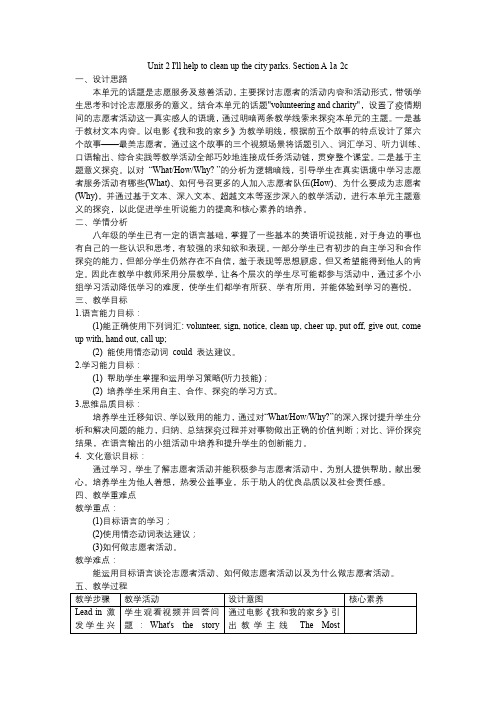
Unit 2 I'll help to clean up the city parks. Section A 1a-2c一、设计思路本单元的话题是志愿服务及慈善活动,主要探讨志愿者的活动内容和活动形式,带领学生思考和讨论志愿服务的意义。
结合本单元的话题"volunteering and charity",设置了疫情期间的志愿者活动这一真实感人的语境,通过明暗两条教学线索来探究本单元的主题。
一是基于教材文本内容。
以电影《 我和我的家乡》为教学明线,根据前五个故事的特点设计了第六个故事——最美志愿者,通过这个故事的三个视频场景将话题引入、词汇学习、听力训练、口语输出、综合实践等教学活动全部巧妙地连接成任务活动链,贯穿整个课堂。
二是基于主题意义探究。
以对“What/How/Why? ”的分析为逻辑暗线,引导学生在真实语境中学习志愿者服务活动有哪些(What)、如何号召更多的人加入志愿者队伍(How)、为什么要成为志愿者(Why),并通过基于文本、深入文本、超越文本等逐步深入的教学活动,进行本单元主题意义的探究,以此促进学生听说能力的提高和核心素养的培养。
二、学情分析八年级的学生已有一定的语言基础,掌握了一些基本的英语听说技能,对于身边的事也有自己的一些认识和思考,有较强的求知欲和表现。
一部分学生已有初步的自主学习和合作探究的能力,但部分学生仍然存在不自信,羞于表现等思想顾虑,但又希望能得到他人的肯定。
因此在教学中教师采用分层教学,让各个层次的学生尽可能都参与活动中,通过多个小组学习活动降低学习的难度,使学生们都学有所获、学有所用,并能体验到学习的喜悦。
三、教学目标1.语言能力目标:(1)能正确使用下列词汇: volunteer, sign, notice, clean up, cheer up, put off, give out, come up with, hand out, call up;(2) 能使用情态动词could 表达建议。

The Power of Friendship: A Journey ofDiscoveryIn the vast landscape of life, friendship stands as a beacon of warmth and companionship. As students progress through their academic journey, the significance of friendships within the classroom and beyond cannot be overstated. This essay delves into the profound impact of friendships on the lives of eighth-grade students, drawing inspiration from the theme of Unit 2 of the Englishtextbook for Grade 8, published by the Yangtze River Press and aligned with the People's Education Curriculum.The unit, centered around the theme of friendships, explores various aspects of this bond, from its formationto its significance in shaping individuals. Through engaging texts and activities, students are introduced to the idea that friendships are not merely casual encounters but are deep-rooted emotional connections that require time, trust, and mutual understanding.In the realm of academic pursuits, friendships act as a powerful motivator. They encourage students to push boundaries, take risks, and embark on new learningexperiences. When faced with challenges or difficulties, friends provide a safe space to share worries, seek advice, and find solace. This support system is invaluable, especially during the critical phase of adolescence, where emotional and psychological well-being is paramount.Moreover, friendships within the classroom foster a positive learning environment. They encourage collaboration, teamwork, and the sharing of ideas and perspectives. When students feel valued and respected by their peers, they are more likely to engage actively in classroom discussions, participate in group activities, and generally exhibit a more positive attitude towards learning.Beyond the classroom, friendships extend into the vast expanse of extracurricular activities. They provide opportunities for students to explore their interests, hobbies, and talents outside the realm of academics. Joint participation in sports, cultural events, and community service projects not only strengthens the bond between friends but also helps them develop a broader perspectiveon life and the world.The impact of friendships, however, is not limited tothe present. They leave lasting impressions on the lives of individuals, shaping their values, attitudes, and behaviors. Friends become role models, mentors, and lifelong companions, influencing each other's choices, decisions,and life paths. The memories and experiences shared with friends become treasured possessions, marking the journeyof life with warmth and joy.In conclusion, the power of friendship is immeasurable. It is a force that transforms lives, ignites passions, and builds bridges of understanding across cultural and social divides. As students in Grade 8 embark on their academic journey, they should cherish and nurture the friendships they form, realizing that these relationships are not justa part of their present but also a vital component of their future.**友谊的力量:一次探索之旅**在生活的广阔天地中,友谊如同温暖和陪伴的灯塔。

人教版八年级英语下册(全册)教案设计、家庭作业设计Unit 1What's the matter?Language Goals 【语言目标】Learn to talk about health problems and accidents. Givesome advice.Knowledge Goals 【知识目标】Key Words matter,throat,foot,stomach,toothache,headache,passenger,herself,sick,knee,hurt,hit,ourselves, accident,situation,knife,blood,X-ray,mean,importance,decision,control,spirit,death,nurseKey Phrases have a stomachache,have a cold, lie down,take one's temperature,have a fever,go to a doctor,get off,to one's surprise,agree to, get into trouble,be used to,take a risk(take risks),run out,cut off,get out of,be in control of, keep on(doing sth.),give upKey Sentences1.What's the matter? I have a stomachache.2.What's the matter with Ben? He has a sore back.3.Do you have a fever? No,I don't. 4.What should I do? You should take your temperature. 5.Should I put some medicine on it? Yes,you should. 6.The driver saw an old man lying on the side of theroad.7.The bus driver stopped the bus without thinking twice. 8.Thanks to Mr.Wang and the passengers,the man wassaved by the doctors in time.9.Put a bandage on it.Key Grammar Describe health problems and give some advice.Ability Goals 【能力目标】1.Be able to describe health problems and give someadvice.2.Enable the students to write conversations about healthproblems or accidents.Moral Goals 【情感目标】1.Let the students know how to keep safe. 2.It is important for them to keep healthy every day.Teaching Time【课时】Five periodsPeriod 1Section A(1a-2d)Period 2Section A(3a-4c)Period 3Section B(1a-1d)Period 4Section B (2a-3b)Period 5Self Check本单元教材以“What's the matter?”为中心话题,围绕着询问及描述“身体状况”进行学习和运用几个常见的句型:What's the matter? I have a stomachache./What's the matter with Ben? He has a sore back./Do you have a fever?No,I don't./What should I do? You should take your temperature./ Should I put some medicine on it? Yes,you should.等。
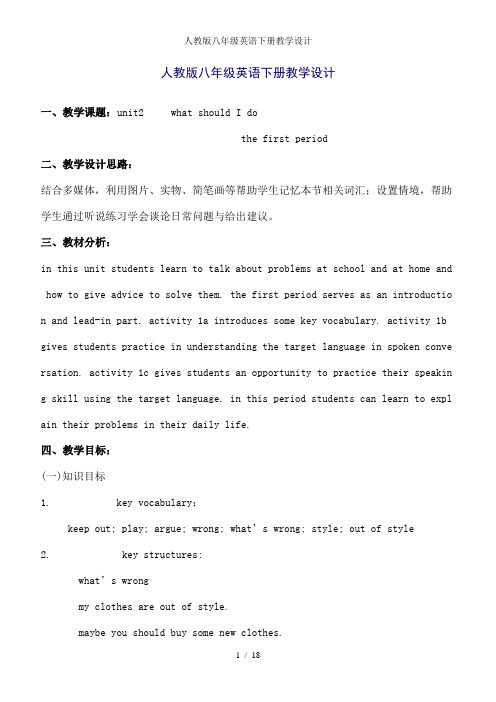
人教版八年级英语下册教学设计一、教学课题:unit2 what should I dothe first period二、教学设计思路:结合多媒体,利用图片、实物、简笔画等帮助学生记忆本节相关词汇;设置情境,帮助学生通过听说练习学会谈论日常问题与给出建议。
三、教材分析:in this unit students learn to talk about problems at school and at home and how to give advice to solve them. the first period serves as an introductio n and lead-in part. activity 1a introduces some key vocabulary. activity 1b gives students practice in understanding the target language in spoken conve rsation. activity 1c gives students an opportunity to practice their speakin g skill using the target language. in this period students can learn to expl ain their problems in their daily life.四、教学目标:(一)知识目标1. key vocabulary:keep out; play; argue; wrong; what’s wrong; style; out of style2. key structures:what’s wrongmy clothes are out of style.maybe you should buy some new clothes.(二)能力目标to train students’ ability of communication and listening skill.(三)情感目标1. to be interested in taking part in all kinds of activities in an english class.. 培养学生良好的合作意识,鼓励学生大胆表达自己的想法和意愿。
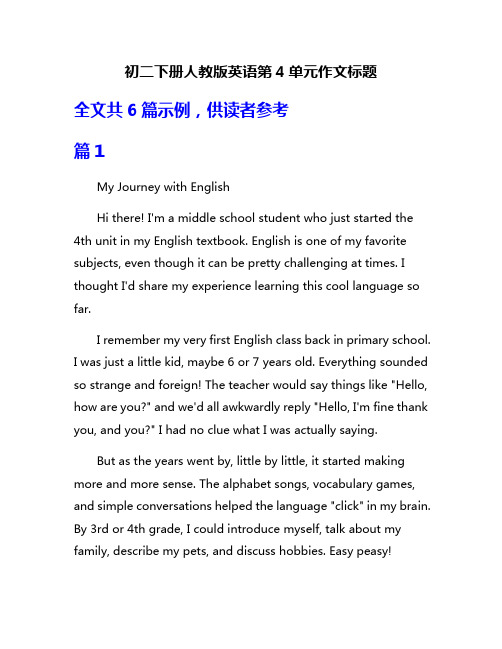
初二下册人教版英语第4单元作文标题全文共6篇示例,供读者参考篇1My Journey with EnglishHi there! I'm a middle school student who just started the4th unit in my English textbook. English is one of my favorite subjects, even though it can be pretty challenging at times. I thought I'd share my experience learning this cool language so far.I remember my very first English class back in primary school.I was just a little kid, maybe 6 or 7 years old. Everything sounded so strange and foreign! The teacher would say things like "Hello, how are you?" and we'd all awkwardly reply "Hello, I'm fine thank you, and you?" I had no clue what I was actually saying.But as the years went by, little by little, it started making more and more sense. The alphabet songs, vocabulary games, and simple conversations helped the language "click" in my brain. By 3rd or 4th grade, I could introduce myself, talk about my family, describe my pets, and discuss hobbies. Easy peasy!Then came the grammar games - singing songs about verb tenses, making posters of word order rules, and playing sentence building competitions. I started being able to piece together my own sentences and short paragraphs. Writing and reading paragraphs was a huge milestone!In 5th grade, we took things to the next level. We learned more advanced grammar concepts like conditionals, passive voice, and reported speech. That's when things got a bitmind-boggling for me. Why did we need to change the tense and pronoun when reporting something someone said? Wasn't the direct quote enough? My teacher always reassured me that more practice would make it click. She was right - it did eventually make sense with time.Now that I'm in middle school, we're exploring even more complexity in English. We spend a lot of time reading passages and stories, watching English videos, and discussing their meanings and lessons. We analyze characters, make predictions, and find evidence in the text. Just last week, we had an interesting debate about two contrasting cultures described in a folk tale.The writing tasks are also much more involved now. We have to write multi-paragraph essays, stories, letters, and other longerpieces. Using transition words, making my point clearly, and keeping my writing organized and logical - that's where I struggle the most. My teacher is always giving me feedback like "Expand on this idea more" or "Your conclusion doesn't quite follow from your arguments." It's frustrating at first, but I can see my writing improving slowly.My favorite part of English class is definitely project work and hands-on activities. A few weeks ago, we did a fun skit acting out characters from a book. I got to be the grumpy old man who learns an important lesson - it was hilarious! We also did a cool "cultural museum" walking tour, where each group set up displays teaching about a country and culture. My group did Mexico, and we brought in Mexican snacks, decorations, and information about traditions. So fun!While English is still pretty daunting with all its complexities and exceptions to the rules, I can't imagine my life without it now. It opens up whole new worlds - books, movies, opportunities to make friends from other countries. I'm already making plans to continue taking English through high school and beyond.Who knows, maybe I'll become an English teacher myself one day! I'd love to go back to those first basics - introducing the alphabet, singing silly grammar songs, and helping other kidsstart their own journeys into this amazing global language. For now, I'm just taking it step-by-step, practice by practice, day by day. Piece by piece, English is becoming a part of who I am.篇2Title: My Dream VacationHi there! My name is Jessica, and I'm a 10-year-old girl from a small town in the countryside. I love going to school and learning new things every day, but one of my biggest dreams is to go on an amazing vacation someday. Let me tell you all about the fantastic trip I've been imagining!First of all, I want to visit a tropical island paradise! I've seen pictures of islands with white sandy beaches, crystal-clear blue waters, and tall palm trees swaying in the gentle breeze. Can you imagine how wonderful it would be to spend a day building sandcastles, swimming in the warm ocean, and hunting for seashells? At night, we could have a beach bonfire and roast marshmallows while gazing up at the starry sky.But my dream vacation wouldn't be complete without some exciting adventures! I'd love to go on a jungle safari and see all sorts of exotic animals in their natural habitats. Imagine spotting a family of elephants taking a refreshing bath in a watering holeor watching colorful parrots soaring through the treetops. It would be thrilling to explore ancient ruins hidden deep in the jungle, uncovering secrets from long ago.Another must-do activity on my dream trip would be visiting a big, bustling city. I want to see towering skyscrapers that seem to touch the clouds and busy streets filled with people from all over the world. We could go shopping in fancy malls, try all kinds of delicious international foods, and visit amazing museums to learn about different cultures and histories.Wherever we go on our dream vacation, I know we'll have the time of our lives. We could stay in fancy hotels with luxurious pools and room service, or we could go camping under the stars and tell ghost stories around the campfire. Either way, it would be an adventure I'll never forget!When I grow up, I want to be a famous author or artist, and I know that traveling to different places and experiencing new things will give me so much inspiration. Who knows, maybe someday I'll write a bestselling book or paint a masterpiece based on the amazing sights and memories from my dream vacation!Well, that's my dream trip in a nutshell. I can't wait until I'm old enough to start exploring the world and making all mywildest vacation dreams come true. For now, I'll just have to keep dreaming and saving up my allowance money. But mark my words, one day I'll have the most incredible, action-packed, once-in-a-lifetime vacation ever!篇3My Unforgettable Summer VacationHi there! My name is Tommy and I'm 10 years old. I just finished 4th grade and I had the most amazing summer vacation ever! I went to a small village called Xinzhuang in the countryside with my parents and little sister Amy. It was the first time I had been to a real village - it was like stepping back in time!The village was super small with only a few hundred people living there. The houses were all really old and made of brick, wood and tiles instead of concrete like the apartment buildings back in the city. There weren't any big supermarkets or shopping malls, just a few tiny mom-and-pop shops selling basic groceries and snacks.We stayed at my grandpa's old house which was built who knows how many years ago! It had a courtyard in the middle with a fishpond and vegetable garden. My bedroom didn't have any AC or fancy furniture, just a hard bed, a wooden desk and an oldwardrobe that squeaked when you opened it. I felt like I had gone back to the olden days!On the first day, I was so excited to explore the village with Amy. We wandered around the narrow alleys, greeted by friendly old folks sitting outside their houses or tending to their gardens and chickens. The fresh country air smelled so good, like freshly cut grass and flowers. We even saw a few lazy dogs snoozing in the sun!One of the coolest things was watching the farmers working in the fields. They didn't use any machines, just simple tools like hoes and shovels. I had never seen plants like corn, wheat and peanuts actually growing out of the ground before! Amy and I tried to "help" out a bit but we kept getting distracted and taking breaks to chase the dragonflies and butterflies flitting around.In the evenings, there wasn't much to do since the village had no cinema, arcade or even a playground. My parents taught us some traditional games like kick the shuttlecock, jianzi and diabolo. We also went catching fireflies and crickets which we kept in a little cage made from bamboo and wire mesh. Listening to the crickets' chirping at night was so relaxing compared to the noise of the city!Sometimes my grandpa's neighbor Mr. Zhang who was a retired teacher would read us stories and folktales from his childhood. We learned about legendary figures like the Cowherd and Weaver Girl and classic tales like The Monkey King. Amy and I would listen with our mouths wide open, completely spellbound!The best part was definitely the food - everything was so fresh and natural. We had lots of yummy dishes made with ingredients from the village like stir-fried greens, sweet potato noodles, farm-fresh eggs and even duck that my grandpa raised himself! I'll never forget the first time I watched him kill andde-feather a duck for our dinner. It seemed kinda cruel at first but that's just how life worked on the farm.On weekends we sometimes went on little trips to nearby towns. I loved exploring the local markets selling all sorts of handicrafts, snacks and random knick-knacks. I bought a bunch of traditional toys and decorations made from wood, bamboo, clay and cloth to take home as souvenirs. We also hiked up a small mountain to visit an ancient temple with the most stunning views over the surrounding hillsides and valleys.Time just flew by too fast and before I knew it, ourmonth-long vacation was over. Saying goodbye to my newvillage friends was really hard - I was going to miss crazy old Mr. Wang who was convinced aliens were going to invade, the neighborhood auntie who made the most delicious jianbing for breakfast, and especially my grandpa.As the bus pulled away from Xinzhuang, I looked out the window and felt a lump in my throat. Part of me wished I could just stay in the village forever away from the noise, pollution and hustle of Shanghai. Country life was so peaceful and simple yet full of adventure every single day. I'm never going to forget the invaluable life lessons I learned about appreciating nature, hard work, community and tradition.I really hope I can go back to Xinzhuang again next summer! Maybe I'll finally find the courage to help grandpa kill andde-feather one of his ducks for dinner. Who knows, by then I might even be a篇4My Wonderful Summer VacationHey there! I'm an 8th grader and I just finished studying Unit 4 of our English textbook. It was all about summer vacation and it really got me excited for the upcoming break. I can't wait to tell you about all the fun things I'm hoping to do!First up, my family is planning a big trip this year. We're going to drive out west to the Rocky Mountains in the United States and go camping for a week or two. I've never been camping before, so I'm both nervous and excited. I've seen pictures and it looks beautiful, with huge snow-capped mountain peaks, crystal blue lakes, and lots of pine trees everywhere. We're going to stay in tents and cook over a campfire. My dad says we might even see some wildlife like deer, elk, or maybe even a bear! As long as we're careful and follow the rules, it should be totally safe though.My dad has already bought a whole bunch of camping gear like tents, sleeping bags, a camp stove, and even a little portable shower thingy. We've been practicing setting up the tents in our backyard, which is good since I'm pretty sure I wouldn't know what to do otherwise. I tried following the instructions but quickly got mixed up with all the different poles and stakes. It's harder than it looks! Thank goodness for my dad being an experienced camper.When we're not out hiking on trails, we're planning to do all sorts of classic camping activities. We'll cook hot dogs ands'mores over the fire, which I'm really looking forward to. I've only ever had store-bought s'mores before, so I can't wait to trymaking them properly with a gooey roasted marshmallow. We'll play fun games too like charades or I-Spy out in nature. And I definitely want to work on my whittling skills with the little pocket knife my dad gave me for safety reasons of course). Maybe I'll even be good enough to make a little wooden animal statue or something!At night after the campfire has died down, we're going to try stargazing. Far away from the light pollution of the city, you can apparently see tons more stars out there. My dad and I have been downloading some stargazing apps to help us identify constellations and planets. I'm hoping to at least spot the Big Dipper, which I've heard is one of the easiest ones to find. Ifwe're really lucky, maybe we'll even see a meteor shower or the Milky Way stretching across the sky! How cool would that be?When we get back from camping, I don't plan on just lounging around at home. For starters, I'm going to visit my grandparents in their little countryside town for a long weekend. They live on a small farm with some cows, chickens, and crops. It's always fun to go feed the animals and run around outside without worrying about traffic or crowds. Grandma makes the absolute best homemade ice cream too using cream from her dairy cows. Nothing beats that on a hot summer day!I'm also hoping to find a little summer job to earn some spending money. Maybe I can do some yard work like mowing lawns or pulling weeds for neighbors. Or I could offer my services as a mother's helper, watching younger kids while their parents are at work. That could involve playing at the park, making simple meals, and just generally keeping them out of trouble. I'm responsible and good with children, so I think I'd be great at that kind of job.When I'm not working or visiting relatives, I'll spend plenty of time hanging out with my friends too. We're planning lots of activities like having water balloon fights, going to the pool or beach, or just biking around the neighborhood. A bunch of us also want to put together a little backyard circus performance that we can show our families. We could do magic tricks, acrobatics, juggling, silly dances - the possibilities are endless! It would take a lot of work to rehearse and make props or costumes, but it would be such an fun memory.Phew, I could probably go on and on with more ideas, but I think you get the picture! Between camping, spending time with family and friends, working a job, and getting prepped for high school, this is shaping up to be one epic summer. I'll be sure totake lots of pictures and videos so I can look back on all these adventures for years to come. It's going to be incredible!So that's my big plan for the upcoming break. I can't wait to make a million new memories. Summer, here I come!篇5Title: My Exciting Journey Through Unit 4Hi there! My name is Emily, and I'm a bubbly 10-year-old who just can't wait to share my thrilling adventure through Unit 4 of our English textbook. Buckle up, because this ride is about to get wild!It all started when our teacher, Ms. Johnson, announced that we were moving on to a new unit. I could barely contain my excitement! Unit 4 was all about "Travel and Transportation," and let me tell you, that's like my favorite thing ever. I mean, who doesn't love dreaming about exploring far-off lands and riding on cool vehicles?The first lesson was all about different modes of transportation. We learned words like "airplane," "train," "bus," and even "hot air balloon"! Can you imagine soaring through the clouds in a giant, colorful balloon? That would be so cool! Ms.Johnson showed us pictures of all these amazing vehicles, and I couldn't help but daydream about the adventures I could have on each one.Next up, we dove into the wonderful world of travel destinations. From towering skyscrapers to pristine beaches, we explored all sorts of exciting places. I remember learning about the Great Pyramids of Giza and the Eiffel Tower. Wow, just thinking about visiting those iconic landmarks makes my heart race with anticipation!But wait, there's more! We also learned how to ask for directions and give instructions. This part was a bit tricky at first, but with some practice, I became a pro at navigating imaginary cities. "Turn left at the intersection, then go straight until you reach the park." Easy peasy!As if that wasn't enough, we even delved into the fascinating world of customs and traditions. Did you know that in some countries, it's considered rude to show the bottom of your feet? Or that in others, slurping your soup is perfectly normal? Learning about different cultures opened my eyes to the incredible diversity of our world.Throughout this unit, we played all sorts of fun games and activities to reinforce what we learned. From charades to boardgames, every lesson was an adventure. My favorite was definitely the "Traveler's Treasure Hunt," where we had to follow clues and solve riddles to find hidden treasures around the classroom. Talk about an adrenaline rush!But you know what the best part was? The project at the end of the unit. We got to create our very own travel brochures, complete with descriptions of our dream destinations and tips for fellow travelers. I chose to highlight the breathtaking Great Barrier Reef in Australia. Can you imagine swimming alongside colorful fish and exploring the vibrant coral? Just thinking about it makes me giddy with excitement!Overall, Unit 4 was an absolute blast! I learned so much about the exciting world of travel and transportation, and my imagination soared to new heights. Who knows, maybe one day I'll become a famous explorer or a globetrotting adventurer!Well, that's my thrilling tale of conquering Unit 4. I hope you enjoyed tagging along on my journey. Until next time, happy travels, and may all your adventures be as exciting as mine!篇6Title: My Unforgettable Summer AdventureHey there! It's me, your friendly neighborhoodmiddle-schooler, ready to share with you the most thrilling adventure I had last summer. Get ready to be swept away by this tale of excitement, laughter, and maybe even a few tears (but happy ones, I promise!).It all started when my parents announced that we were going on a family camping trip. Now, I'll be honest, at first, I wasn't too thrilled about the idea. Sleeping in a tent? No Wi-Fi? Dealing with bugs and nature? Yeah, not exactly my idea of a good time. But my parents convinced me that it would be a great opportunity to bond as a family and experience something new.So, with a backpack full of snacks and a reluctant heart, we hit the road. The drive seemed to last forever, but the moment we arrived at the campsite, something inside me shifted. The fresh mountain air, the sound of a nearby stream, and the towering trees all around us – it was like stepping into a whole new world.Setting up our tent was a hilarious ordeal. My dad, who fancies himself an expert outdoorsman, struggled with the poles and pegs, while my mom and I tried (and failed) to stifle our giggles. Eventually, with the help of a kind fellow camper, wemanaged to get our little home-away-from-home up and running.The first night was a bit of a shock to my system. The quietness was almost deafening, and the stars seemed to twinkle with a brilliance I had never noticed before. But as I lay there, listening to the sounds of nature, I felt a strange sense of peace wash over me.The next few days were filled with adventures galore. We went on hikes through the lush forest, spotted all kinds of wildlife, and even tried our hand at fishing (spoiler alert: we didn't catch anything, but it was still a blast!). One particularly memorable moment was when we stumbled upon a hidden waterfall. Without hesitation, we stripped down to our swimsuits and took a refreshing dip in the crystal-clear pool.But my personal highlight was the night we gathered around the campfire. My dad regaled us with spooky stories that had us huddled together, wide-eyed and clutching our marshmallows for dear life. My mom, ever the voice of reason, would chime in with her own tales of courage and perseverance, reminding us that even in the darkest of times, there's always a light at the end of the tunnel.As the days passed, I found myself growing more and more attached to this simple, unplugged way of life. There was something incredibly freeing about being disconnected from technology and reconnecting with nature and my family.As our trip came to an end, and we packed up our gear to head back home, I felt a twinge of sadness. Part of me didn't want to leave this magical place behind. But I also knew that the memories we had created would stay with me forever.Looking back, that camping trip taught me so much more than just how to pitch a tent or build a fire. It reminded me of the importance of slowing down and appreciating the simple things in life. It showed me。
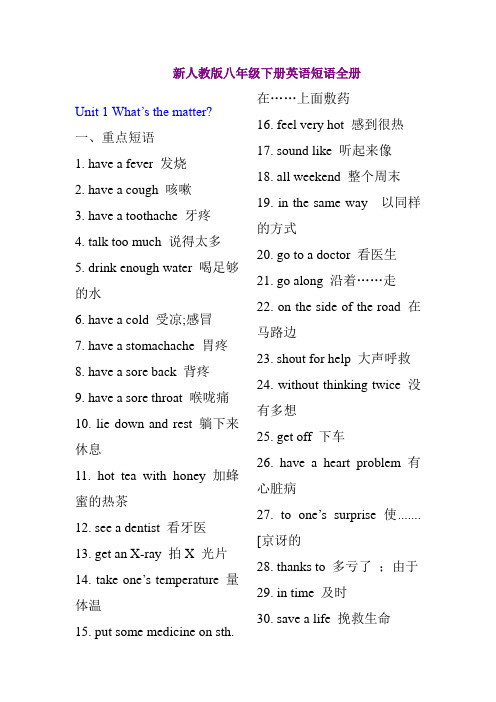
新人教版八年级下册英语短语全册Unit 1 What’s the matter?一、重点短语1. have a fever 发烧2. have a cough 咳嗽3. have a toothache 牙疼4. talk too much 说得太多5. drink enough water 喝足够的水6. have a cold 受凉;感冒7. have a stomachache 胃疼8. have a sore back 背疼9. have a sore throat 喉咙痛10. lie down and rest 躺下来休息11. hot tea with honey 加蜂蜜的热茶12. see a dentist 看牙医13. get an X-ray 拍X 光片14. take one’s temperature 量体温15. put some medicine on sth. 在……上面敷药16. feel very hot 感到很热17. sound like 听起来像18. all weekend 整个周末19. in the same way 以同样的方式20. go to a doctor 看医生21. go along 沿着……走22. on the side of the road 在马路边23. shout for help 大声呼救24. without thinking twice 没有多想25. get off 下车26. have a heart problem 有心脏病27. to one’s surprise 使....... [京讶的28. thanks to 多亏了;由于29. in time 及时30. save a life 挽救生命31. get into trouble 造成麻烦32. right away 立刻;马上33. because of 由于34. get out of 离开;从……出萍35. hurt oneself 受伤36. put a bandage on sth. 用绷带包扎37. fall down 摔倒38. feel sick 感到恶心39. have a nosebleed 流鼻血40. cut his knee 割伤他的膝盖41. put her head back 把她的头向后仰42. have problems breathing 呼吸困难43. mountain climbing 登山运动44. be used to doing sth. 习惯做某事45. run out (of) 用完;用尽46. so that 以便47. so. . . that 如此……以至于…48. be in control of 掌管;管理49. in a difficult situation 在闲境屮50. keep on doing sth. 继续或坚持做某事51. make a decision 做出决定52. take risks 冒险53. give up 放弃二、重点句型1. What’ s the matter?What’ s the matter with you?= What’s the trouble with you? = What’ s wrong with you?你怎么了?2. What should she do?她该怎么办呢?Should I take my temperature? 我应该量一下体温吗?主语+ should/shouldn’t + 动词原形. ..①You should lie down and rest. 你应该躺下休息一会儿。
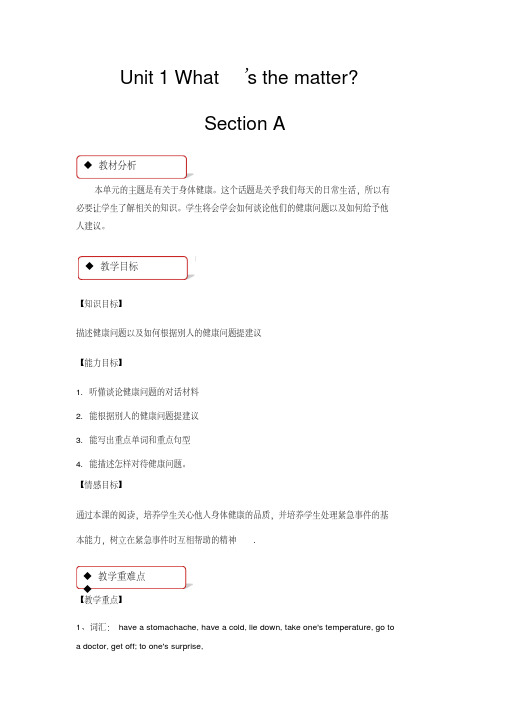
Unit 1 What’s the matter?Section A◆教材分析本单元的主题是有关于身体健康。
这个话题是关乎我们每天的日常生活,所以有必要让学生了解相关的知识。
学生将会学会如何谈论他们的健康问题以及如何给予他人建议。
◆教学目标【知识目标】描述健康问题以及如何根据别人的健康问题提建议【能力目标】1.听懂谈论健康问题的对话材料2.能根据别人的健康问题提建议3.能写出重点单词和重点句型4.能描述怎样对待健康问题。
【情感目标】通过本课的阅读,培养学生关心他人身体健康的品质,并培养学生处理紧急事件的基本能力,树立在紧急事件时互相帮助的精神.◆教学重难点◆【教学重点】1、词汇:have a stomachache, have a cold, lie down, take one's temperature, go toa doctor, get off; to one's surprise,2、句型:1. ——What's the matter?—— I have a stomachache. You shouldn't eat so much next time.2 . ——What's the matter with Ben?——He hurt himself. He has a sore back.——He should lie down and rest.【教学难点】掌握情态动词should shouldn't.的用法;学习have的用法◆课前准备◆Multimedia, group work, cooperative discussion.◆教学过程Step1. Warm up1. Look at the picture and learn the parts of the body.2. New words and phrases.Step 2 Presentation1. 1aLook at the picture. Write the correct letter [a-m] for each part of the body. Then check the answers.2. 1bFirst, lead Ss to read the five names.Then look at the picture. Number the names 1-5.Finally, check the answers.3. 1cDivide two Ss into a pair to make conversations. Finally, invite several pairs to actout for the class.Step 3 Practice1. 2aTell Ss there are five conversations. In each conversation the person says what’s going on with them. Listen carefully and number the pictures.Play the tape. Then check the answers.2. 2bAsk Ss to listen to the recording again to match the problems with the advice.Play the recording again. Then check the answers.3. 2cAsk Ss to make conversations using the information in 2a and2b. Give them enough time to do this task. Later, invite several pairs to present their conversations to the class.Step 4 Consolidation1. 2dFirst, ask Ss to have a fast reading of the conversation to get the main idea.Then, lead Ss to read the conversation sentence by sentence, explain some language points.Finally, divide Ss into pairs to practice role-playing the conversation.2. 3aFirst, read the passage quickly and answer the question.Then, lead Ss to read the passage and analyse the key points.Finally, read together.3. 3bRead the passage again and check the things that happened in the story3cDiscuss the questions with a partner.4. Grammar focusFirst, lead Ss to read the sentences.Then, prompt Ss to analyse the use of model verb should.After that, explain the grammar together.5. 4aAsk Ss to fill in the blanks.Then , invite some Ss to present their answers.6. 4bAsk Ss to circle the best advice for these health problems, then add their own advice.After that, invite some Ss to present their advice.7. 4cOne student mimes a problem. The other students in your group guess the problem and give advice.Step 5 Language pointsStep 6 HomeworkMake a conversation about health problems and giving advice.Unit 1 What’s the matter?Section B◆教材分析本单元的主题是有关于身体健康。
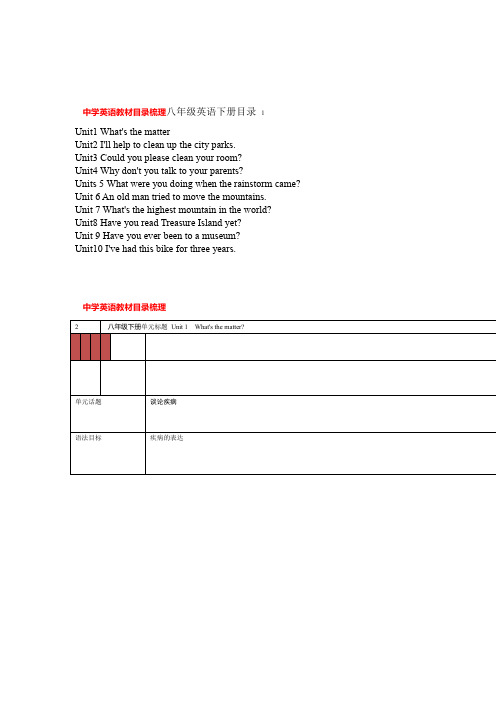
中学英语教材目录梳理八年级英语下册目录 1
Unit1 What's the matter
Unit2 I'll help to clean up the city parks.
Unit3 Could you please clean your room?
Unit4 Why don't you talk to your parents?
Units 5 What were you doing when the rainstorm came? Unit 6 An old man tried to move the mountains.
Unit 7 What's the highest mountain in the world?
Unit8 Have you read Treasure Island yet?
Unit 9 Have you ever been to a museum?
Unit10 I've had this bike for three years.
中学英语教材目录梳理
中学英语教材目录梳理
中学英语教材目录梳理
中学英语教材目录梳理
中学英语教材目录梳理
中学英语教材目录梳理
中学英语教材目录梳理
中学英语教材目录梳理
中学英语教材目录梳理
中学英语教材目录梳理
中学英语教材目录梳理12。
新人教版八年级下册英语短语全册Unit 1 What’s the matter?一、重点短语1. have a fever 发烧2. have a cough 咳嗽3. have a toothache 牙疼4. talk too much 说得太多5. drink enough water 喝足够的水6. have a cold 受凉;感冒7. have a stomachache 胃疼8. have a sore back 背疼9. have a sore throat 喉咙痛10. lie down and rest 躺下来休息11. hot tea with honey 加蜂蜜的热茶12. see a dentist 看牙医13. get an X-ray 拍X 光片14. take one’s temperature 量体温15. put some medicine on sth. 在……上面敷药16. feel very hot 感到很热17. sound like 听起来像18. all weekend 整个周末19. in the same way 以同样的方式20. go to a doctor 看医生21. go along 沿着……走22. on the side of the road 在马路边23. shout for help 大声呼救24. without thinking twice 没有多想25. get off 下车26. have a heart problem 有心脏病27. to one’s surprise 使....... [京讶的28. thanks to 多亏了;由于29. in time 及时30. save a life 挽救生命31. get into trouble 造成麻烦32. right away 立刻;马上33. because of 由于34. get out of 离开;从……出萍35. hurt oneself 受伤36. put a bandage on sth. 用绷带包扎37. fall down 摔倒38. feel sick 感到恶心39. have a nosebleed 流鼻血40. cut his knee 割伤他的膝盖41. put her head back 把她的头向后仰42. have problems breathing 呼吸困难43. mountain climbing 登山运动44. be used to doing sth. 习惯做某事45. run out (of) 用完;用尽46. so that 以便47. so. . . that 如此……以至于…48. be in control of 掌管;管理49. in a difficult situation 在闲境屮50. keep on doing sth. 继续或坚持做某事51. make a decision 做出决定52. take risks 冒险53. give up 放弃二、重点句型1. What’ s the matter?What’ s the matter with you?= What’s the trouble with you? = What’ s wrong with you?你怎么了?2. What should she do?她该怎么办呢?Should I take my temperature? 我应该量一下体温吗?主语+ should/shouldn’t + 动词原形. ..①You should lie down and rest. 你应该躺下休息一会儿。
②You shouldn’t go out at night.你晚上不应该出去。
3. Do you think it comes from a newspaper or a book?你认为它是来自报纸还是书呢?4. I think I sat in the same way for too long without moving.我想我以同样的姿势一动不动地坐得太久了。
5. She said that the man had a heart problem and should go to the hospitalUnit 2 I’ll help to clean up the city parks.一、重点短语1. Clean-Up Day 清洁日2. an old people’s home 养老院3. help out with sth. 帮助解决困难4. used to 曾经…过去_5. care for 关心;照顾6. the look of joy 快乐的表情7. at the age of 在......岁时8.clean up 打扫(或清除)干净9. cheer up (使)变得更高兴;振雀10. give out 分发;散发11. come up with 想出;提出12. make a plan 制订计划13. make some notices 做些公告牌14. try out 试用;试行15. work for 为…工作;为…. 效力16. put up 建造;举起;张贴17. hand out 分发;散发;发给18. call up 打电话;召集19. put off 推迟;延迟20. for example 比如;例如21. raise money 筹钱;募捐22. take after 与......相像;像23. give away 赠送;捐赠24. fix up 修理;修补;解决25. be similar to 与……相似26. set up 建立;设立27. disabled people 残疾人28. make a difference 影响;有作用29. be able to 能够30. after-school reading program课外阅读项目二、重点句型1. The boy could give out food at the food bank.这个男孩可以在食品救济站分发食物。
2. Clean-Up Day is only two weeks from now.清洁日离现在仅仅两周的时间。
3. He volunteers at an animal hospital every Saturday morning.每周六上午,他都在一'家动物医院当志愿者。
4. Last year, she decided to try out for a volunteerafter-school reading program.去年,她决定去参加一个课外阅读项目的志愿者的选拔。
5. . . . you can see in their eyes that they’ re going ona different journey with each new book.……从他们的眼睛里你可以看到他们正在进行每本不同的新书之旅。
6. I want to put off my plan to work in an animal hospital until next summer.我想把我在动物医院工作的计划推迟到明年夏天。
7. Most people today are only worried about getting good jobsto make lots of money.现在的大部分人只是为找一份能挣许多钱的好工作而着急。
8. You helped to make it possible for me to have Lucky. 在你的帮助下,我才有可能拥有“幸运儿”。
Unit 3 Could you please clean your room?一、重点短语1. go out for dinner 出去吃饭2. stay out late 在外面待到很晚3. go to the movies 去看电影4. get a ride 搭车5. work on 从事6. finish doing sth. 完成做某事7. clean and tid y 干净整洁8. do the dishes 洗餐具9. take out the rubbish 倒垃圾10. fold your/the clothes 叠衣服11. sweep the floor 扫地12. make your/the bed 整理床铺13. clean the living room 打扫客厅14. no problem 没问题15. welcome sb. 欢迎某人16. come home fro m school/ work放学/下班回家17. throw down 扔下18. sit down 坐下19. come over 过来20. take sb. for a walk 带某人去散步21. all the time 一直;总是22. all day/evening 整曰/夜23. do housework 做家务24. shout back 大声回应25. walk away 走开26. .share the housework 分担家务27. a comfortable home 一个舒适的家28. in surprise 惊讶地29. get something to drink 拿点喝的东西30. watch one show 观看一个节目31. hang out 闲逛32. pass sb. sth. 把某物传给某人33. lend sb. sth. 把某物借给某人34. get sth. wet 使某物弄湿35. hate to do sth. 讨厌做某事36. do chores 做杂务37.help sb. (to ) do /with sth帮助某人干某事38. bring a tent带顶帐篷来39. buy some snacks买些小吃40. go to the store去商店41. invite sb. to a party邀请某人参加聚会42. make sb. do sth. 使某人做某事43. enough stress足够的压力44. a waste of time浪费时间45. in order to为了46. get good grades取得好成绩47. mind doing sth. 介意做某事48. depend on依赖;依靠49. develop children’s independence发展孩子的独立性50. look after/take care of 照顾;照看51. do one’ s part in (doing ) sth.做某人分内的事二、重点句型1. Could you please…..do sth. ? Could you please clean yourroom?你能整理一下你的房间吗?2. I have to do some work.我必须干些活。